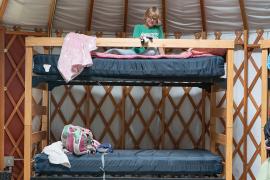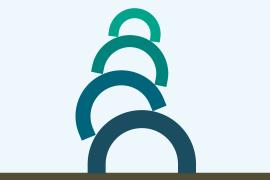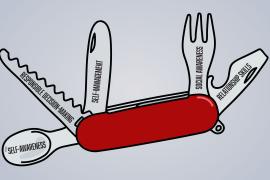I had just finished running a marathon and had flopped onto the grass to rest. I was so tired that I hadn’t registered that the tired runner sitting next to me was a former camp counselor. He had worked at my camp eight years earlier and quit after just three weeks. He was a well-liked counselor who had been doing a great job, so I remembered feeling disappointed that he had not completed the season. I had not, however, given him or his departure any thought since the time he left.
He had apparently been thinking about it a lot. He reintroduced himself and proceeded to tell me how much he regretted leaving camp early. He said that he had not, in fact, had to go home to deal with a sick family member as he had reported at the time. Instead, he had been feeling homesick. He said he had really enjoyed the work and the people he had met, and he knows now that staying for the summer and working through his homesickness would have been a better choice.
–Excerpt from Happy Campers: 9 Summer Camp Secrets for Raising Kids Who Become Thriving Adults
There will come a day this summer when you will think about quitting. Maybe you’re in training week now and you’re already second-guessing your decision to work at camp this summer. Like anything new, there’s an adjustment period as you find your people and find your groove.
Almost everyone who works at camp — including your longtime camp directors and leadership staff — has had hard days or weeks when they considered throwing in the towel and giving up on the job. Ask them, and they’ll tell you the stories about their worst days at camp.
This job may be the hardest one you’ve ever had. When you feel overwhelmed, discouraged, or exhausted, know that every camp counselor feels that way at some point during the summer.
If you are willing to work through the hard emotions, your job as a counselor has the potential to be the most rewarding experience you’ve had in your life. Here are some tips for facing the inevitable difficult moments.
Why Am I Here?
On your hardest days this summer — whether due to a challenging camper, a conflict with a coworker, or just feeling stressed and exhausted — you might wonder, “What am I doing here when I could be at home on my couch binging Netflix and snacking on my favorite foods?”
I love Simon Sinek’s book Find Your Why. (His TED talk is equally helpful.) Sinek said, “Our WHY is the thing we give to the world, and we must look inside ourselves to discover it. Our closest friends can help us identify our WHY as they reflect on the space we fill in their lives” (2021). As you start this summer, I encourage you to think about your why for being a camp counselor. Ideally, you can talk with at least one friend about your why. If you interview each other, here are a couple questions to ask:
- What was it that made you want to work at camp this summer?
- What would you like your campers to say about you — and your impact on them — at the end of the summer?
Possible Whys
If you’re not exactly sure why you’re working at camp, here are a few ideas:
- You crave being a part of a community and building lifelong friendships with your coworkers.
- As you look ahead to your career and life goals, you know that the communication and leadership skills you grow this summer will help you get where you want to go.
- You want to be inspired by your work and to do something that is meaningful and positively impacts others.
- You are sick of being on your laptop and iPhone all the time, doomscrolling and hoping for inspiration.
- You want to spend quality time outside and interact face-to-face with other human beings.
- You want to improve your physical, mental, social, and/or spiritual well-being.
- You were a camper yourself, and you fondly remember your camp counselors and the positive impact they had on you. You want to pay it forward and be that encouraging mentor to your own campers this summer.
- You love your camp’s mission. Whether your camp is a general camp that serves all kinds of kids or a specialty camp that brings together kids with similar needs, you’re excited to be part of the camp’s big purpose and vision.
- You anticipate that a future job will require you to sit at a desk in business casual attire, and you relish the idea of working on a lake in your bathing suit and a life jacket.
- You’re excited to try some new things, stretch outside your comfort zone, and grow your skills and confidence.
Do any of these whys resonate with you?
Take a few minutes to talk with one of your new friends or coworkers about which of these are most compelling.
Hindsight Is 20/20
Sometimes we see things more clearly in the rearview mirror.
I’ve been at my camp for nearly four decades, so I’ve seen thousands of counselors come through. Some stay for several seasons. Some stay for just one. But the feedback we hear is often the same. When they are in the middle of the summer, they often think (and say) things like, “This has been really fun, but I definitely won’t be back next summer.”
Camp ends, a few months go by, and then they realize how much they miss the community, the fun, the meaning, and the connection they felt at camp. Looking back, they understand how impactful the experience was. By October, many counselors have decided to return for another summer.
Stress Isn't All Bad
Not all stress is bad. In fact, only when we feel an appropriate amount of stress do we actually grow. We're out of our comfort zone and in our growth or learning zone.
According to mentalhelp.net, the following are examples of “positive personal stressors” (MentalHelp.net, 2023):
- Receiving a promotion or raise at work
- Starting a new job
- Marriage
- Buying a home
- Having a child
- Moving
- Taking a vacation
- Holiday seasons
- Retiring
- Taking educational classes or learning a new hobby
Starting any new job, especially one in a new setting and with new people, can be stressful. But just like if you do strength training with weights you only gain muscle through practicing and experiencing a bit of struggle and pain, you will only grow your leadership and communication muscles by stretching them. You will be stretched this summer. Sometimes, in a moment when you’re feeling stressed, you may think it’s too hard and you can’t do it. It doesn’t feel comfortable. That’s when you need to circle back to your why for being here and seek ways to persevere.
Since we’ve established that everybody has a hard day or a hard week at camp, let’s talk about what you can do when your difficult day or week arrives. Let’s plan ahead by identifying some coping strategies.
Coping Strategies
Find your people
The most important thing to prepare yourself now to handle the hard days that come this summer is to find your support person or people at camp. You’ve likely already started building some relationships. Maybe you’ve already identified a friend or two who you think really could be a good support. That’s awesome! Your camp has a support network for you too. Your supervisor has been trained to support and guide you this summer. Just like your job is to create positive experiences for your campers, your supervisor’s job is to help you do great work and have a positive experience at camp.
No crying alone
If you’re feeling sad or discouraged, don’t cry alone. Seek out your support person.
Get more sleep
You need seven to nine hours of sleep every night (Suni, 2022). You may not always get that much sleep when you’re not at camp, but getting enough sleep this summer is extremely important. You may feel most discouraged and stressed at day’s end, but that’s not the best time to ruminate and try to solve problems. After an especially hard day, put yourself to bed as early as possible, and see how you feel when the sun comes up and you are well rested. Often, a good night’s sleep can help you reframe your struggles so they don’t feel quite so daunting.
Look Outside Yourself
Mahatma Gandhi said, “The best way to find yourself is to lose yourself in service of others.” Look around and find someone else who looks like they may be struggling. Ask them how they’re doing. Provide a listening ear. Don’t try to solve their problem. Share your own feelings and struggles. Simple things you can say: “Are you OK?” or “Something’s wrong. I’m worried about you.”
When we start focusing more on others, we often find ourselves feeling better. And there are plenty of others to focus on in the camp community!
Create a Countdown Calendar
Your work at camp is a short-term commitment in your life’s big picture. Your entire time at camp is likely less than 80 days. Just like you will counsel your homesick campers this summer, keep the nature of the job in mind. Unlike stressful, exhausting, full-time jobs that have no end date, this job is by its nature intense and immersive — and it will go by quickly but can have long-lasting rewards, especially in the relationships you’ll form.
The most common times counselors quit are during their first two to three weeks at camp and in the middle of the summer. During your first two weeks, you will be building community and learning your job. You likely haven’t yet experienced what it feels like to successfully be a camp leader, because you've had very little practice. If you quit before you’ve really gotten started, you will never know if you could have grown and succeeded in the job.
About halfway through your summer, you may find yourself wistfully thinking ahead to moving back to college, traveling, or whatever is next on your schedule. You may be tempted to buy yourself some extra rest time by departing camp early, before you’ve completed your commitment. Your remaining two to four weeks may feel like an eternity, but look at your countdown calendar. You’ve only got 14 to 28 days left.
Before You Quit
Laura Cassiday, PhD, a NeuroLeadership Institute writer, said, "In a recent survey by Joblist, 26 percent of people who quit their previous job say they regret the decision. And with more than 50 million Americans quitting in the past year, that’s a lot of regrets" (2022).
Before you quit your job this summer, try to imagine yourself a year from now. What regrets might you have about leaving camp early?
“Macaroni” was the camp name of the marathoner who left his camp counselor job early. Eight years after not mustering the grit to stay at camp, he’d found the resilience to run a 26.2-mile race. (We never stop growing our grit.) But eight years after he quit, he still regretted the decision.
Photos courtesy of Camp Chinqueka, Bantam, CT; Camp Romaca, Hinsdale, MA.
References
- Cassiday, L. (2022, September 15). Resignation regret? Here’s what you can do. NeuroLeadership Institute. neuroleadership.com/your-brain-at-work/resignation-regret
- MentalHelp.net. (2023). Types of stressors (eustress vs. distress). mentalhelp.net/stress/types-of-stressors-eustress-vs-distress/
- Sinek, S. (2021, October 6). Find your why. YouTube. youtube.com/watch?v=tF7YLGpOoz8
- Suni, E. (2022, August 29). How much sleep do we really need? Sleep Foundation. sleepfoundation.org/how-sleep-works/how-much-sleep-do-we-really-need
Audrey Monke, with her husband Steve, has owned and directed Gold Arrow Camp (Lakeshore, California) since 1989. On her website and podcast, Sunshine Parenting (sunshine-parenting.com), Audrey shares ideas, stories, and resources for parents and youth development professionals. Audrey’s book, Happy Campers: 9 Summer Camp Secrets for Raising Kids Who Become Thriving Adults (Hachette-Center Street, 2019) shares strategies for bringing the “magic” of camp home.





